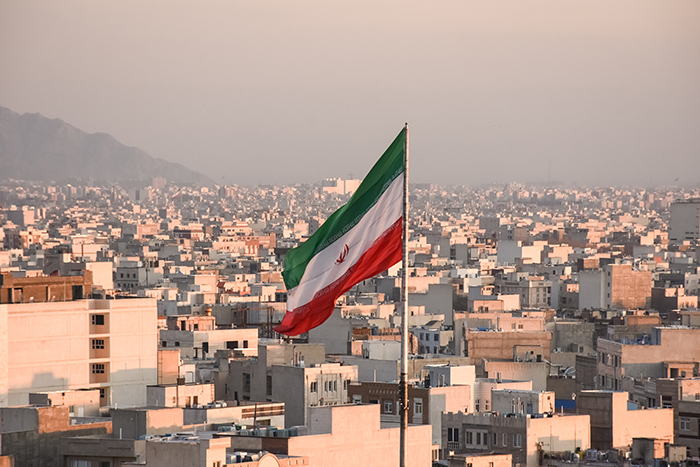Interviews / Middle East / North Africa
2 September 2025
Iran Nuclear Deal: Towards a Reactivation of Sanctions Against Tehran?

On 28 August 2025, France, Germany and the United Kingdom officially informed the United Nations Security Council of their intention to reinstate Western sanctions against Iran, using the snapback mechanism included in the Iranian nuclear agreement (JCPOA). This agreement, signed in July 2015 by the five permanent members of the UN Security Council (China, the United States, France, the United Kingdom and Russia), Germany, the European Union and Iran, aims to control the development of Iran’s nuclear programme in exchange for the lifting of bilateral and multilateral sanctions against the country. The activation of the snapback would result in the reimposition of UN sanctions within 30 days if no diplomatic alternative were to be found. In what context does this European initiative inscribe itself? What reactions has it provoked in Iran? What prospects does it open up regarding the future of relations between Iran and the West? An analysis by Thierry Coville, Research Fellow at IRIS and specialist on Iran.
In what geopolitical context have France, Germany and the United Kingdom activated this snapback mechanism?
From a legal standpoint, September represented the last opportunity for European countries to trigger this snapback procedure, since the nuclear agreement signed in July 2015 officially expires in October 2025.
The geopolitical context is quite specific because negotiations had been initiated between Iran and the United States over the Iranian nuclear issue. Five rounds of talks had already taken place, but before the sixth could be held, Israel launched an attack pursuing two objectives: the destruction of Iranian nuclear facilities and the intention to provoke regime change in Iran.
From the Iranian perspective, this conflict has generated two major feelings. On the one hand, a sense of betrayal towards the United States, which, while actively participating in the negotiations, had, according to Tehran, validated or even cooperated with Israel in the attack carried out last June. On the other hand, a feeling of anger towards the International Atomic Energy Agency (IAEA), which, according to Tehran, had “paved the way” for the Israeli attack in its latest report through its lack of neutrality. This situation led to the adoption of a law by the Iranian parliament suspending its cooperation with the agency (the suspension officially began on 2 July 2025).
Nevertheless, there was still an awareness of the need to resume negotiations between Iran and the United States, as they represent the only way to resolve this issue peacefully and avoid another conflict with Israel. It is in this context that the Europeans intervened. Since the beginning of negotiations between the United States and Iran, Europe had remained somewhat on the sidelines, and this snapback procedure, like a last card to play, appears as a way of exerting pressure on Iran to force the country to negotiate with the United States.
To obtain a six-month suspension of this snapback procedure, France, Germany and the United Kingdom have asked three things of Iran: firstly, to resume negotiations with the United States; secondly, to re-establish contact with the IAEA and in particular to allow them to conduct on-site inspections of the Iranian nuclear programme; thirdly, to provide precise information on the location of its stock of 60% enriched uranium, which amounts to nearly 400 kilos and could eventually allow Iran to build atomic bombs.
Legally, in one month, the sanctions will be applied if no agreement is reached to suspend this procedure beforehand. The countries therefore have one month to negotiate. If Iran meets these three conditions, UN sanctions will be postponed for several months. A positive scenario in this case would be that this delay allows for the conclusion of a new agreement between Iran and the United States. In such a case, a resolution could be presented to the UN Security Council that would definitively cancel the reinstatement of these sanctions.
For now, the use of the snapback can be seen as a means of pressuring Iran to negotiate, with the Europeans themselves probably not convinced that UN sanctions should be reinstated.
How has this decision been received in Tehran and among the Iranian population? What could be the consequences for Iran and, more broadly, for the balance of power in the Middle East if sanctions are reinstated?
Une fois encore, un fort sentiment de colère prévaut du côté des autorités iraniennes, ces derniers considérant que les Européens ne sont pas légitimes à utiliser leur recours à ce mécanisme.
Once again, a strong sense of anger prevails among Iranian authorities, who consider that the Europeans are not legitimate in resorting to this mechanism.
This lack of legitimacy stems from the fact that the snapback, let us recall, allows for sanctions to be reimposed under the 2015 agreement if Iran failed to comply with its terms. However, the first members not to comply with the agreement, after the United States, were the Europeans themselves. Iran was complying with the agreement when the United States withdrew from it in May 2018 and unilaterally reimposed all American sanctions. Faced with the extraterritorial nature of these sanctions, the Europeans did nothing. Moreover, they ended their economic relations with Iran and stopped purchasing Iranian oil. One could argue that they had no choice, but factually, they themselves failed to comply with the 2015 agreement.
Another crucial element for the Iranians is that the Europeans did not condemn the Israeli attack against Iranian nuclear facilities and even approved it according to certain statements, although it was a total violation of the 2015 agreement. While the Israeli attack aimed to destroy Iran’s uranium enrichment plants, the 2015 agreement had in fact granted Iran the right to enrich uranium.
Thus, while the European recourse to the snapback is legally included in the agreement, the Iranians are challenging the legitimacy of its use. In response, Tehran has raised the possibility of withdrawing from the Nuclear Non-Proliferation Treaty (NPT), although this option seems to be considered only as a last resort, to be used only if negotiations fail to resolve this crisis. Negotiation therefore remains the preferred path for Iranian leaders to emerge from this crisis.
Among the Iranian population, there is great concern, particularly regarding the country’s economic activity, which is almost at a standstill. The Iranian currency has further depreciated against the dollar in the days following the European declaration (the dollar surpassing the symbolic threshold of 100,000 tomans). The country is also facing shortages of water and electricity. Finally, there is great uncertainty about the precarious ceasefire with Israel: no one knows whether the war will resume. If UN sanctions are added to all these elements, the situation will continue to deteriorate, raising widespread concern.
What scenarios can be envisaged for the future of relations between Iran and European countries, and more broadly with the Western world?
It must be emphasised that for Iran, the impact of UN sanctions will be more political than economic. Economically, these sanctions would give any UN member state the right to inspect cargoes bound for Iran if suspected of links to the Iranian ballistic or nuclear programme. But above all, UN sanctions will isolate Iran on the international stage, placing the country on the “bench of nations” in relation to international law. There is then a fear that this context could legitimise a new Israeli attack.
If these sanctions are applied, they will make it extremely difficult to restore normal political and economic relations between Europe and Iran. The situation could encourage a renewed rapprochement with Russia, but above all with China, with which Iran hopes to maintain its oil exports.
As for the United States, it is clear that this entire issue revolves around the relationship between Tehran and Washington. Relations will likely be severely degraded, and in a worst-case scenario, Iran could withdraw from the Non-Proliferation Treaty. Even if the situation worsens over time, to avoid reaching the point of war, it appears essential that the United States manages to negotiate with Tehran. In Iran, the recent appointment of Ali Larijani as Secretary General of the Supreme National Security Council could potentially play a favourable role in such an outcome, as he had already been directly involved in nuclear negotiations in the 2000s. There is therefore one month left for diplomacy to play its part.

